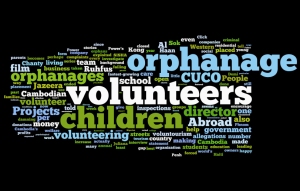 It is truly amazing how integrated the world is becoming. Sure, we have nation states proclaiming their territorial sovereignty by rattling their sabres and striving to gain the respect and recognition of the global community; but, underlying this is the reality that the virtual community is crossing every single cultural, ethnic, religious and physical boundary to such a degree that we may eventually give up border-tenacity altogether.
It is truly amazing how integrated the world is becoming. Sure, we have nation states proclaiming their territorial sovereignty by rattling their sabres and striving to gain the respect and recognition of the global community; but, underlying this is the reality that the virtual community is crossing every single cultural, ethnic, religious and physical boundary to such a degree that we may eventually give up border-tenacity altogether.
Voluntourism is one of the emerging expressions of boundary detachment, proliferating throughout social media and Web 2.0, that is, in contradistinction, non-virtual. We are talking about real people crossing real borders seeking real opportunities to explore AND make a real difference. The egg-chicken question, nonetheless, begs to be asked: Is the integration of virtuality through such mechanisms as prosumption fueling voluntourism, or vice versa?
A brilliant article – – “Crowdsourced cartography: mapping experience and knowledge” – – was recently brought to my attention by my colleague Luc Lapointe. Authors Martin Dodge and Rob Kitchin take us on a three-part journey into the realm of crowdsourced geo-spatial representations on the Web via prosumption, “volunteerists” (or citizen scientists), and the “ignorance of crowds.” At one point in the article, Dodge & Kitchin offer a paragraph that will look eerily familiar to those of you who are following the ongoing volunoturism debate:
The apparent willingness of many people to participate for ‘free’ in crowdsourcing projects is undoubtedly based on the fact that they provide genuinely effective platforms to connect socially, communicate meaningfully, and contribute collectively. There are, of course, ongoing debates around the worth of these connections and communications, with critics arguing that they are superficial, lacking depth and obligatory commitment (Carr, 2007). There are also concerns over the unpredictability of crowds, their narrow demographic profile [the worry being that they are dominated by unrepresentative digital elites (see Crutcher and Zook, 2009)], the quality and consistency of content and metadata created across diversely skilled/motivated individuals, how to provide documented degrees of reliability and generate a sense of trustworthiness, and the extent to which the model is sustainable (will volunteers continue to give ‘free’ labour next week, next month, and next year; what happens when the crowd disperses?)” [p.20]
{Source: Dodge M, Kitchin R, 2013, “Crowdsourced cartography: mapping experience and knowledge” Environment and Planning A 45(1) 19 – 36}
The shocking similarity between the critical commentary on crowdsourced cartography and that of young people venturing forth to volunteer in communities across the globe deserves our attention. Is this because voluntourism is a form of crowdsourced development? Is voluntourism the result of prosumers entering a realm that has been reserved for aid & development professionals for generations? What is this prosumption that Dodge & Kitchin are referring to?
Prosumption
“ the producers of much that exists on Web 2.0 are simultaneously the consumers of what is produced and there is a fluid relationship between production/consumption and producers/consumers. In terms of the latter, this is the emergence of the ‘prosumer’.” Ritzer (2008, page 8)” [p. 21]{Source: Dodge M, Kitchin R, 2013, “Crowdsourced cartography: mapping experience and knowledge” Environment and Planning A 45(1) 19 – 36}
In the realm of voluntourism, we are discovering that voluntourists are both “producers” of service to a destination and “consumers” of the touristic activities which are available to them in a given destination. They are, therefore, “prosumers” in the same sense that Dodge & Kitchin cite Ritzer as defining in the above quote. What is not clear, yet would benefit from some discussion among academics and other researchers, is whether voluntourism is an outgrowth of “virtual” prosumption.
Additional Questions: Is voluntourism the “reality”-version of virtual crowdsourcing? Are travelers advancing a form of crowdsourced, prosumer-based development that is integrating socio-economic impacts within destinations? Is crowdsourced virtuality leading us to collectively believe we can tackle the world’s real problems in the same manner? Has our 24-7 media cycle, filled with all that is negative and disconcerting in the world, catalyzed a generation of prosumer-voluntourists? Has the public sector’s and aid community’s inability to satisfactorily meet the MDGs lit a fire under our collective posteriors to get out there and do something, anything? All of the above?
Final Thoughts…
It may or may not be ultimately significant to know if prosumption is fueling voluntourism and/or vice versa. What we do know is, that in either case, determining the driving forces behind the voluntourism movement will definitely help us to better understand and truly meet the growing demand of individuals to travel the world and render service. What Dodge & Kitchin bring to our attention in reference to crowdsourced cartography could very well assist us in shaping the reality of the voluntourism environment. We know voluntourists are prosumers; we know voluntourists can make contributions as (“citizen servants”); and we know that if these contributions are not properly guided, we can have “ignorant” outcomes and impacts on communities.
Voluntourism is clearly a movement for prosumers, yet, we have not developed a functional crowdsourcing platform for voluntourism in real world destinations. Might be a good time to take this into consideration, however, as it won’t get any easier as the future becomes the present.